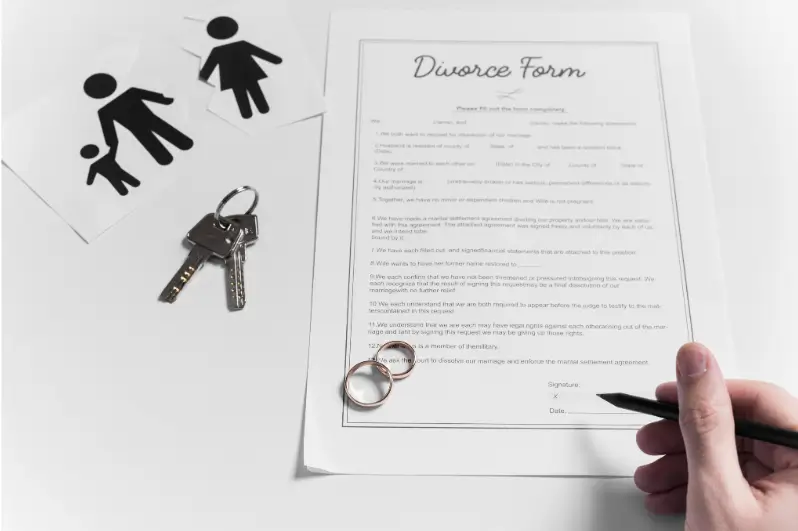Filing a case against your husband in the UAE can be complex.
This article explains how to file a case against husband in UAE, including the grounds, procedures, and considerations according to current personal status laws.
If you’re considering taking legal action in 2025, it’s essential to understand the steps involved, your rights, and the legal framework that governs your case.
Get professional help from our lawyers in UAE. Click the WhatsApp icon below.
فهرس المقال
How to File a Case Against Husband in UAE
Filing a case against your husband in the UAE involves several steps.
Whether it’s a case of divorce, alimony, custody, or dowry, the UAE’s legal system provides a clear procedure for handling such matters.
Here’s how to go about it:
Determine the Grounds for Filing a Case
Before filing, it’s essential to know the reasons for the case. Some common grounds include:
- Divorce: When Civil Personal Status Law is applicable, either spouse can file for divorce in the UAE without proving fault or harm (Mutual Divorce in Dubai, UAE).
- Alimony: You may seek alimony after divorce, depending on factors such as marriage duration, financial contributions, and the husband’s ability to provide.
- Custody: You can file for custody and visitation rights if you have children.
- Dowry and Gifts: Claims related to the dowry or marital gifts can also be pursued in court.
Learn about the Khula Procedure in UAE. Read about Divorce During Pregnancy in UAE.
Understand the Jurisdiction and Court
In the UAE, personal status cases are handled by the Family Court. You will file your case in the court of the emirate where you live or where the marital home is located.
If your husband resides abroad, you may still file a case in the UAE if you reside there.
Gather Required Documents
You will need to collect several documents to file your case, including:
- Marriage certificate.
- Identification documents (e.g., passport, Emirates ID).
- Proof of residence.
- Evidence supporting your claims (financial records, communication logs).
File the Case in the Family Court
Once your documents are ready, you can file the case with the relevant Family Court.
This involves submitting your completed application forms and paying the required court fees.
The Court Procedure
After filing, the court will schedule hearings. There may be a referral for family guidance sessions before the court proceedings begin.
Both parties will present their arguments and evidence. The court will then issue a judgment based on the case’s merits.
Enforcing the Court’s Judgment
If the court rules in your favor, you can request enforcement of the judgment. This may include orders for alimony payment, child custody, or asset division.
The court will handle enforcement, and you may need legal assistance for this step.
Legal Services for Filing a Case Against Husband in UAE
Our lawyers and legal consultants in Dubai specialize in helping clients navigate the process of filing personal status cases UAE.
We provide comprehensive legal services to protect your rights throughout the legal procedure. Here are the key services we offer:
- Divorce Proceedings
We assist clients in initiating divorce cases and ensure that the divorce is filed properly and in accordance with UAE laws. - Alimony Claims
If you’re seeking alimony after a divorce, our experienced lawyers will help you file claims for financial support. - Custody and Visitation Rights
Our firm handles custody cases, helping you secure custody of your children if needed. We also ensure that fair visitation rights are arranged for both parties, prioritizing the children’s best interests. - Dowry and Marital Gifts Claims
We assist in filing cases related to dowries and other marital gifts, ensuring you are compensated according to the law. - Legal Advice and Representation
Throughout the entire process, our lawyers provide legal advice and representation.
Whether you are filing for divorce, alimony, or custody, we ensure that your rights are protected every step of the way.
FAQs about Filing a Claim against Husband in UAE
Conclusion for how to file a case against husband in UAE.
Filing a case against your husband in the UAE involves understanding the legal process and following the right steps.
By knowing your rights and seeking the help of experienced legal professionals, you can ensure that your case is handled correctly and under UAE laws.
If you are considering legal action, our law firm is here to assist with the entire process, offering expert advice and representation tailored to your needs.
Contact our lawyers in the UAE for expert support. Click the WhatsApp icon below.
Was this helpful?
Specialized Legal Content Writer, possessing deep legal knowledge and exceptional ability to demystify legislation and analyze judicial developments. He delivers clear, precise content that helps you understand your legal rights and obligations while empowering you to make informed decisions across diverse legal domains. Working within our expert legal team, he ensures credibility and trustworthiness in every piece of content.
